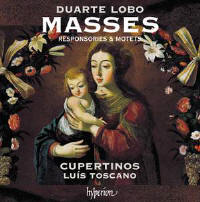Texte paru dans: / Appeared in: |
|
|
Outil de traduction ~ (Très approximatif) |
|
|
Reviewer: J.
F. Weber Duarte Lôbo (c. 1565–1646), the Portuguese composer, is not to be confused with Alonso Lobo (1555–1617), the better-known Spanish composer. Lôbo’s career progressed rapidly until he became mestre de capela at the cathedral of Lisbon during the last five decades of Spanish reign over Portugal, which extended from 1580 to 1640. He published 15 Masses in two books (1621 and 1639); two Requiems, Missa Vox clamantis (Fanfare 16:5), and Missa de beata Virgine (32:6) have already been recorded, and two more Masses are offered here, announced by the prominent title MASSES on the cover, larger than the composer’s name. The program begins with his most familiar motet, Audi vocem de caelo à 6 (10:4, 17:6, 20:3, 39:6), and ends with another, Alma redemptoris mater à 8 (32:6). All the rest of these works are first recordings: two Masses and eight responsories for Matins of Christmas. The Peter Phillips disc containing the Mass and the six-voice Requiem is the only full CD devoted entirely to Lôbo until now, since composers of the Portuguese Renaissance have more often been recorded in collections. Most notable were the four LPs on Philips (a boxed set here on Mercury), two LPs on EMI Portugal imported by Titanic (8:2), and a set of three LPs on Telefunken (later on CD). The last included a Magnificat by Lôbo. Toscano’s first recording was devoted entirely to another composer of the era, Manuel Cardoso, an exact contemporary of Lôbo (42:4), a disc equally devoted to record premieres. The Cupertinos are an ensemble that produces a rich, warm sound entirely appropriate to the southern clime. Ten singers are named, including Toscano, who sings with them; eight appear in a photo taken in front of the striking neoclassical Bonfim Church in Porto. Lôbo’s Masses exhibit a clarity of text that may be credited both to the composer’s setting and to the ensemble’s enunciation. These Masses, both published in 1621, are among four parody Masses based on motets of Guerrero; four others use motets of Palestrina. (Guerrero’s motet Sancta Maria may be heard on a Musica Ficta CD, 29:6). In his notes Toscano points out ingenious techniques of parody and transformation in these two Masses. The responsories are set for four voices with the verse and doxology reduced to three. They were published with other music for Christmas in Opuscula, a 1602 edition that began his association with the Officina Plantiniana in Antwerp; of the partbooks, tenor I is lost, but has been newly reconstructed by José Abreu for a critical edition. The neglect of this glorious music is difficult to understand, but Toscano and others before him (Peter Phillips, James O’Donnell, Jeremy Summerly, Harry Christophers, Philippe Herreweghe, Gareth Wilson, and especially Owen Rees) have at least begun to let us hear this late aspect of the Renaissance that flourished in Portugal. The Cupertinos bring a native enthusiasm and love to these performances that place them ahead of all others. It is a fitting successor to their début disc of Cardoso. After hearing one, you will want the other as well. Stayed tuned for their next installment, and don’t miss these two superb discs.
| |
|
|
|
|
Cliquez l'un ou l'autre
bouton pour découvrir bien d'autres critiques de CD |
|




